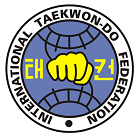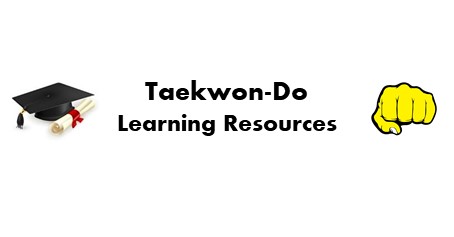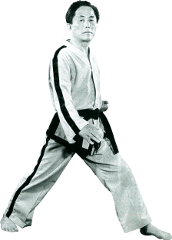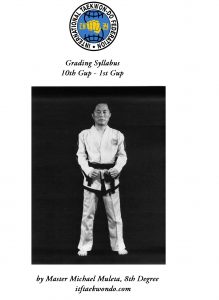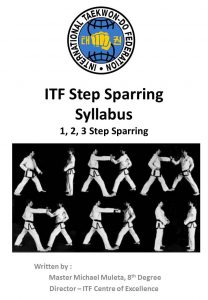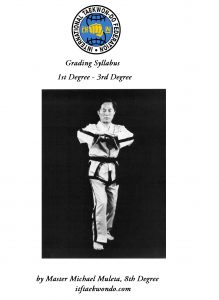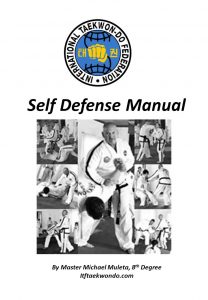Moral Culture
Often left for the senior ranks, and those adult in years, Moral Culture is a concept whereby a person strives to be the best they can be, not just in skill but in character.
The broad connotations and various possible interpretations of the moral culture are often very difficult for the western mind to grasp because this is an aspect of Oriental Philosophy which pervades the lives of Oriental people.
In a word, it is the endeavor and process of becoming an exemplary person such as Confucius (552-479 AD).
To become such a person, one has to first find himself and acquire a moral character which is respected by all. This can only be achieved through constant practice of mental discipline.
Thus, if the times call for it, the mentally disciplined man can contribute to the building of an ideal society through wise counsel to the government and, even after death, through his everlasting examples.
Confucius said, “to promote the sense of morality one must treat others with faithfulness and sincerity based on righteousness, and to eliminate completely vicious thinking”.
Moral Culture : Desirable Character Traits
Everyone of us, as a social being, desires to live in a free and peaceful society. At the same time, it is our obligation to build such a society for the people. I have quoted various words of wisdom of ancient saints and philosophers for creating an ideal society in the hope that students of Taekwon-Do use them as a guide to cultivating their moral culture.
An ideal society, according to LAO-TZU, is one in which the ruler is of such high moral character that he can rule naturally, not by interference or fear but by appealing to the good nature of his people, who by merely doing their duty can live freely in peace without fear and anxiety.
Next, a moral society is one in which the people admire and praise their ruler in gratitude for his love and the benign disposition he bears toward his people.
Thirdly there is a “legalistic society in which the ruler, because he lacks the moral authority, resorts to various laws to govern his people, who in turn obey because they fear the retribution that the violation of these laws will bring.” Under these circumstances, the ruler loses touch with his people.
Finally, the worst kind of society is that in which the ruler, through deception and trickery, misuses his legal authority to further his personal ambitions and imposes his rule upon his people by force as he deems necessary.
In such a society, the ruler is despised and hated by his people and eventually invites not only his own downfall but with him the downfall of the people and the country.
In Taekwon-Do a heavy emphasis is placed on moral culture, for it not only promotes a healthy body and keen mind but good sportsmanship and the perfection of moral behavior.
As ancient Greeks first espoused in their sound mind, sound body, creative spirit concept, the more disciplined and cultivated the mind is, the more disciplined and cultivated will be the student’s use of Taekwon-Do.
No doubt the following lessons may be somewhat hard to fully understand; however, it would behoove the serious student of Taekwon-Do to read, digest, and attempt to grasp these very fundamental essences of moral culture.
- Return to the basic nature – Mencius gave the following analogy when he reasoned that a man is basically good. Even a ruthless robber, coming upon an innocent child about to fall into a well, will try to save the child, forgetting for the moment, his intention to rob the house. This good nature becomes obscured or completely lost by greed for money and power.
- Be virtuous – It is difficult to define what virtue is. However, these are five human qualities which have been recognized as virtues since ancient times; humanity, righteousness, courtesy, wisdom, and trust. To be virtuous one must constantly cultivate and practice these virtues. Confucius said, “Virtue is like the North Star. All the stars revolve around it in an orderly fashion.” Therefore, people who surround the virtuous person, naturally will act for the betterment of society.
HUMANITY
The ability to feel sorrow for the misfortunes of fellow men and love them all equally as parents love their children equally.
Confucius defined humanity in the following ways:
- To love people, especially one’s parents.
- Not asking others to do what you would rather not do.
- To behave with the nature of propriety by controlling on oneself.
- To have unbending desire to accomplish what is right regardless of how insignificant the result may initially seem when compared to the amount of effort put forth.
- To value others’ honor before your own.
- To put others’ freedom, before your own.
To implement humanity he said one should:
- Practice utmost prudence, modesty and discretion in everyday life.
- Devote oneself to assigned work be it large or small.
- Demonstrate sincerity with whole-heartedness to others at all times.
Tae Kong Mang (12th century BC) said; “The heaven provides us four seasons while the earth has the power to produce all living things. This privilege is not reserved for any specific person but for all human beings… Therefore, humanity lies in the idea of sharing the fruits of nature with all people.”
RIGHTEOUSNESS
The ability to feel ashamed of unjust acts and to do one’s duty to others.
Mencius said; “for the ordinary person life and death are the most important in the life. However, for the virtuous person to and live and die for righteousness is far more important than life and death themselves.”
Righteousness is well defined in the act of a certain army general depicted in the book of “War Manual” written about 2,400 years ago. A General was taking a break from the grueling war with his soldiers by a river bank when an aide brought him a small carafe of wine for his refreshment. He took the carafe and slowly emptied it into the flowing river in full view of the puzzled soldiers and invited them to share the wine with him by taking a sip of the water from the river.
PROPRIETY
Unlike animals fighting over food, a courteous man would offer another man a piece of bread even though both were starving, out of respect and good manners.
Confucius said, “propriety must be practiced for the proper development of personality, and whoever lacks sincerity in his words, cannot be considered a gentleman.”
WISDOM
The ability to judge right from wrong, not especially in matters concerning the right and wrong of others but in matters concerning oneself.
A wise man (Yu Bee) once said to his sons, “no matter how small it is you should not do what you realize is wrong. On the other hand you must do what is right no matter how small it may seem.”
TRUST
The ability to keep one’s words and promises, not only to one’s friends but to everyone in general.
Without trust a person loses all principles and dignities and becomes a liar and a cheater.
Moral Culture : Desirable Behaviour Traits
There are two ways by which a person can find himself; first, by preserving the goodness given to him by God or heaven at birth, and secondly by renouncing greed for material things.
Man may occupy two positions in a lifetime
Basically there are two kinds of position; one is the live virtues given by heaven, explained earlier, and the other given by man, such as a cabinet minister, bureau chief, and so on.
Unfortunately man often relies too much on worldly position which is transient at best, for what man gives can also be taken away. On the other hand, what heaven endows us with is eternal.
This is not to say that we reject all worldly things but rather that we keep both positions in proper balance so that the virtues of the former position provides guidance for the proper use of the latter.
In this manner a man will gain respect and set good examples for others to follow. Without proper guidance, a person can easily fall victim to the temptations of personal power and wealth, employing unethical means to further his ambitions.
Ultimately such a person will become a tyrant, or a dictator and an enemy of the people.
According to Confucius, a generous and loving man cannot have enemies. Therefore, humanity, the first virtue, is like a strong secure fortress.
Greed is Insatiable
He who is content with what he has is the richest man in the world. On the other hand, if one has everything and still more, he may yet be poor.
A man who is blinded by greed is not only given to corruption, intrigue and exploitation of others, but worst of all, he casts himself in the position of “friend fighting against friend, father fighting against son,” finally becoming no better than an animal.
There is certain truth in the old saying that a truly good person cannot be rich, and a rich person cannot be a truly good person. According to an ancient adage, “constant material dissatisfaction is considered to be the root of all misfortunes.” There is no better way to self satisfaction and human growth than the constant development of a generous nature.
Be humble
A weed holds up its head in arrogance while a mature grain bows its head in humility.
Lao-Tzu taught that lofty virtue is like a deep valley into which all streams of water flow. A virtuous man will draw the respect of others toward him in the same fashion while one who is selfish and egotistic will lose the respect of his fellow man and become despised and isolated.
To be humble is not to engage in petty squabbles, but to be like the river in the low valley which irrigates the farm fields around it.
Self-criticism
No one is wise from the moment of birth.
As human beings we have many faults and are prone to make mistakes. However, once having acquired knowledge we learn to correct these shortcomings. It would not be impossible to eventually become perfect human beings.
For this purpose, it is essential not to be idyllic towards learning and continue to be willing to criticize oneself.
It is said that Confucius and his pupils practiced self-criticism by repeating the following three times daily:
- Have I neglected others’ requests because of selfishness
- Have I behaved with a sincere attitude towards friends
- Have I inspired others with certainty, while being uncertain myself
- Have I neglected to practice virtue
- Have I erred in my studies
- Have I avoided acting with righteousness
- Have I corrected myself immediately upon realizing my fault
Be Soft
Because light is formless and soft, it can illuminate and give warmth to even hidden corners.
As water can assume any shape or form, it can better serve the living things that need to survive. Once water becomes a part of the ocean, even the largest ship is like a mere leaf, and its awesome fury when aroused can conquer the tallest mountain.
If one claims to be strong, he will soon meet someone who is stronger. A tree, such as a sapling, can withstand a strong wind when it is soft and flexible but may be toppled or broken after it becomes old and brittle. The same principle also applies to human beings.
Respect of elders
As son respects parents, younger brother respects older brother, man must always respect his elders or seniors.
This is the beauty of mankind, and one of the distinctions between human and animal.
Mencius said there are three things of value in human society: position, honor and moral integrity. In government, position is considered important, in a community, honour, and for a leader or advisor, moral integrity.
Indeed, there can be no children without parents, nor a young generation without the old generation. A society and a nation could not avoid chaos without its culture and social order being based on respect for the knowledge and wisdom of its elders.
Respect the rights of others
To criticize someone who is better, to covet other’s possessions and to steal the merits of others are the marks of an unscrupulous man.
Mother Nature does make claims to her domain, yet all creatures within it acknowledge her eternal accomplishments. To help others develop and succeed in life is a reward in itself and has a true value only if nothing is expected in return.
Throughout human history, people who in jealousy have stolen the recognition due to others and have stolen their possessions out of avarice have always left dark imprints of shame and dishonor.
Be just
To be correct and forthright is to live one’s life correctly.
Old sages used to say; “To common men, life is most valuable, and death, most fearful” However, a righteous man would value justice above life itself and would be willing to die rather than submit to injustice.
Be frugal
Since ancient times, excessive luxury and pleasure caused the downfall of many kings and nations without exception and history is full of such examples.
Persons in leadership in particular must learn to be frugal and live moderately. As the old adage goes “if the water is muddy upstream so it will be downstream.”
An extravagant leader will affect his subordinates in this same way and will bring more hardship to his subjects through increased taxation and bribery.
Be discreet
In every thing he does, a person must not be impulsive or reckless but be patient and thoughtful.
“He who acts without thinking at least three times, will later regret his action,” warns an old proverb.
Accordingly, on a matter of an important appointment or punishment, one must not decide hastily but must deliberate to reach a decision that is both fair and objective.
Know true happiness
Lao-Tzu pointed out that nature was based upon harmony contrasts.
For example, the universe was made up of two forces, Yin (female) and Yang (male). Other contrasts were hard and soft, long and short, night and day, solid and empty, cold and warm, big and small, beautiful and ugly.
All things in this world are relative to one another. Misery can only come from having been happy once and sorrow from joy. The wealthy and the powerful are not necessarily happy. For every rich person, there are countless poor and for each tyrant, a nation of oppressed. Mencius defined life’s three happiness’s as follows:
- Healthy parents and harmony within the family.
- To live with pride and honor through correct behavior.
- To educate the young to become upright and useful members of society.
Let your actions speak for yourself.
Even the ablest orator is apt to err if given to verbiage.
A closed mouth can save a fish from the hook as well as stay secrets from the enemy. To speak only what is meaningful is a sign of a cultivated person. People talk mostly to brag about themselves or to gain advantage over others.
A man of virtue expresses himself more through deeds than words. Thus, he influences others through living examples. In the old days, the truly effective way to teach was believed to be by the actions not by the words of the teacher.
Develop peace of mind
A clear pond becomes muddy if agitated and then returns to its original state when allowed to settle undisturbed.
It is said that calm will be able to conquer the heat. Undoubtedly you can endure the hottest summer heat if you sit calm and composed. Conversely, if you move too much in order to warm your freezing body you may get temporary relief, but it does not last too long.
We can attain peace of mind through meditation, by emptying our minds of all petty thoughts and returning to the natural state of man.
Unlike in Buddhism or Zen, meditation in Taekwon-Do does not mean a total divorce from the world, like a dead body, but rather an active moment to reflect on our past mistakes in silence and in the privacy of our thoughts, and through penitence, to continue our self-improvement toward becoming better men and women. This active thought process in silence is called “Jung-Joong-Dong.”
Be firm of mind
A person of strong conviction is unsuspicious and unafraid.
When proved wrong, he has the moral strength to admit his mistakes to even the most humble and has the courage to stand up to the mighty if he believes himself or herself to be right.
Strong conviction can be gained through the broad and deep “Ki”-spirit. Ki is a form of active energy which fills every physical cell and organ while “Chi”- will is the motivating force: the former moves, the latter leads.
If “Ki” is nurtured with great care and allowed to grow based on humanity and justice, its soaring power and outreaching strength can fill the heaven and earth, enabling man to reach a new height of great achievements, so Mencius exhorted his disciples.
On a more practical level “Ki” helps us to keep our minds clear and alert when the affairs of life become strained and confused, or sees us through sleepless nights when our loved one is gravely ill.
Be devoted
As meditation is to the religious, concentration and devotion is to the artist, and perseverance is to the laborer, so is moral culture to the practitioner of the martial arts.
A person’s unflinching dedication to his own interest and duty is the source of life and power. Cultivation of mind, therefore, is no monopoly of any particular person.
The sincerity and effort definitely produce the belief and the belief makes one able to reach the final goal. Moral culture is considered to be a cultivating movement to make one devote oneself to his work, whatever it might be, until his life and work become one.
Moral Culture : Summary
In summary, we can enjoy a greater freedom of action by preserving our basic nature while making ourselves impervious to the temptation of power, money and sex.
It must indeed seem like an impossible undertaking to a mere mortal. A mountain crossing begins with a single bold step and an ocean begins with each small stream.
As ancient proverbs say; “Where there is a will there is a way.” With a strong will and firm determination, it is within the reach of anyone who is willing to make the effort.
This moral culture is uniquely tied in with Taekwon-Do, not only for the eventual attainment of the highest goals in Taekwon-Do and the promotion of power, technique, and self-confidence, but also for the cultivation of character.
Without this, the instructor would be guilty of imparting a devastating force to those who could eventually become so enamored of their newly found techniques they might very easily become bullies or use this knowledge as a means to achieve their personal ambitions.
From the works of General Choi Hong Hi, Founder of Taekwon-Do
In addition to links on the resources pages, you may also like to consider our series of Ebooks in our Online Store.
Our E-books come with detailed instructional information, step by step descriptions and video link to all sequences.
